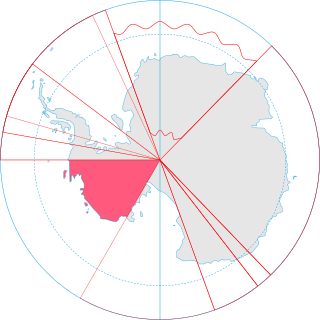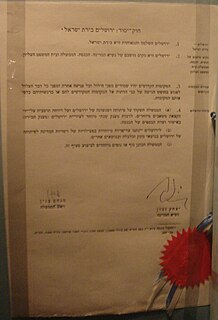Related Research Articles

Sovereignty is the defining authority within an individual consciousness, social construct or territory. Sovereignty entails hierarchy within the state, as well as external autonomy for states. In any state, sovereignty is assigned to the person, body, or institution that has the ultimate authority over other people in order to establish a law or change an existing law. In political theory, sovereignty is a substantive term designating supreme legitimate authority over some polity. In international law, sovereignty is the exercise of power by a state. De jure sovereignty refers to the legal right to do so; de facto sovereignty refers to the factual ability to do so. This can become an issue of special concern upon the failure of the usual expectation that de jure and de facto sovereignty exist at the place and time of concern, and reside within the same organization.
The controversy surrounding the political status of Taiwan is a result of World War II, the second phase of the Chinese Civil War (1945–1949), and the Cold War.

The Sovereign Military Order of Malta (SMOM), officially the Sovereign Military Hospitaller Order of Saint John of Jerusalem, of Rhodes and of Malta, commonly known as the Order of Malta, Malta Order or Knights of Malta, is a Catholic lay religious order, traditionally of a military, chivalric, and noble nature. Though it possesses no territory, the order is often considered a sovereign entity of international law, as it maintains diplomatic relations with many countries.

Terra nullius is a Latin expression meaning "nobody's land". It was a principle sometimes used in international law to justify claims that territory may be acquired by a state's occupation of it. There are currently three territories claimed to be terra nullius, two of which caused by border disputes between sovereign states, and one caused by no sovereign state claiming the land.
In the United States, a territory is any extent of region under the sovereign jurisdiction of the federal government of the United States, including all waters. The United States asserts sovereign rights for exploring, exploiting, conserving, and managing its territory. This extent of territory is all the area belonging to, and under the dominion of, the United States federal government for administrative and other purposes. The United States total territory includes a subset of political divisions.

Novation, in contract law and business law, is the act of –
- replacing an obligation to perform with another obligation; or
- adding an obligation to perform; or
- replacing a party to an agreement with a new party.
The act of cession is the assignment of property to another entity. In international law it commonly refers to land transferred by treaty. Ballentine's Law Dictionary defines cession as "a surrender; a giving up; a relinquishment of jurisdiction by a board in favor of another agency." In contrast with annexation, where property is forcibly seized, cession is voluntary or at least apparently so.
Westphalian sovereignty, or state sovereignty, is a principle in international law that each state has exclusive sovereignty over its territory. The principle underlies the modern international system of sovereign states and is enshrined in the United Nations Charter, which states that "nothing ... shall authorize the United Nations to intervene in matters which are essentially within the domestic jurisdiction of any state." According to the idea, every state, no matter how large or small, has an equal right to sovereignty. Political scientists have traced the concept to the Peace of Westphalia (1648), which ended the Thirty Years' War (1618–1648) and Eighty Years' War (1568–1648). The principle of non-interference was further developed in the 18th century. The Westphalian system reached its peak in the 19th and 20th centuries, but it has faced recent challenges from advocates of humanitarian intervention.

The Island of Palmas Case was a territorial dispute over the Island of Palmas between the Netherlands and the United States which was heard by the Permanent Court of Arbitration. Palmas was declared to be a part of the Netherlands East Indies and is now part of Indonesia.
Popular sovereignty is a doctrine rooted in the belief that each citizen has sovereignty over themselves. Citizens may unite and offer to delegate a portion of their sovereign powers and duties to those who wish to serve as officers of the state, contingent on the officers agreeing to serve according to the will of the people. In the United States, the term has been used to express this concept in constitutional law. It was also used during the 19th century in reference to a proposed solution to the debate over the expansion of slavery. The proposal would have given the power to determine the legality of slavery to the inhabitants of the territory seeking statehood, rather than to Congress.

Annexation, in international law, is the forcible acquisition of one state's territory by another state, usually following military occupation of the territory. It is generally held to be an illegal act. Annexation is a unilateral act where territory is seized and held by one state, is distinct from conquest and differs from cession, in which territory is given or sold through treaty.
A number of methods of acquisition of sovereignty are or have been recognised by international law as lawful methods by which a state may acquire sovereignty over territory. International law adopts much of Roman property law in regards to acquisition of sovereignty due to the underlying European civil law at the time of early discovery voyages such as Christopher Columbus. The basis of acquisition of states ownership of vacant territory therefore continues to apply,.

A sovereign state, also known as a sovereign country, is a political entity represented by one centralized government that has supreme legitimate authority over territory. International law defines sovereign states as having a permanent population, defined territory, one government, and the capacity to enter into relations with other sovereign states. It is also normally understood that a sovereign state is independent. According to the declarative theory of statehood, a sovereign state can exist without being recognised by other sovereign states. Unrecognised states will often find it difficult to exercise full treaty-making powers or engage in diplomatic relations with other sovereign states.
City of Sherrill v. Oneida Indian Nation of New York, 544 U.S. 197 (2005), was a Supreme Court of the United States case in which the Court held that repurchase of traditional tribal lands 200 years later did not restore tribal sovereignty to that land. Justice Ruth Bader Ginsburg wrote the majority opinion.